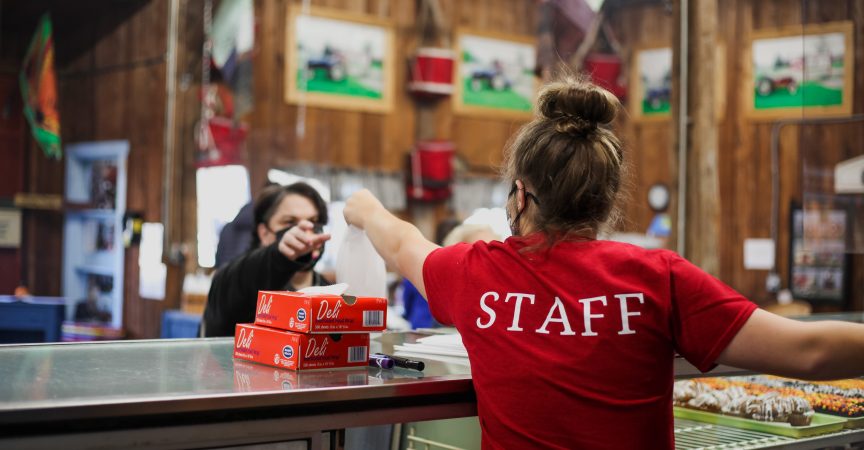Getting a pulse on the foodservice industry with Restaurants Canada President & CEO Todd Barclay
As we wrap up this year’s edition of RC Show, Restaurants Canada President & CEO Todd Barclay wants us to understand why this Show is different than others, and why this year’s Show is coming at an imperative time: “This year’s theme of ‘Feeding the Recovery’ has never been more appropriate,” says Barclay. “It is time to rebuild, reinvent and reconnect as we take stock of the past year, and we look forward to a brighter future.”
While things may be different than last year, attendees could still count on valuable networking opportunities, a dynamic virtual Exhibit Hall, and world-class content from RC Show. This year’s Show highlighted a number on pressing issues like labour, mental health, anti-racism, and more. These are pivotal topics to touch on at such a rocky time in our industry.

We checked in with Todd to get his thoughts on these issues and to understand major challenges facing our community.
MENU MAG: In terms of labour, how was the foodservice industry affected by the pandemic? Can you take us through some of major stats?
TODD BARCLAY: The restaurant sector lost more jobs in the first six weeks of the pandemic than the entire Canadian economy during the 2008-2009 recession. At the height of the pandemic, our industry lost over 800,000 jobs.
It is important to note that no other sector is still experiencing such a shortfall. While all other industries have recovered about 90 per cent or more of their pandemic job losses, at least 25 per cent of the foodservice workforce has still not returned to work in the restaurant sector. There are still more than 316,000 fewer jobs in the foodservice sector than there were in February 2020.
It is vital that we are able to recover these lost jobs. Restaurants are the number 1 source of first jobs for young Canadians, providing a launchpad for fulfilling and rewarding careers. Women make up 58 per cent of the restaurant workforce; 31 per cent of restaurant owners, operators, and staff belong to a visible minority; and half of all Canadian restaurants are run by entrepreneurs who came here as immigrants.
If we want to build back a stronger, more resilient Canada that continues to reflect our country’s incredible diversity, our industry is the best place to start.
When it comes to liquor regulations, restaurants have seen benefits from being able to deliver alcohol. What changes to regulations or licensing do restaurant operators need to see now in order to benefit their bottom line during the pandemic?
With our 2019 Raise the Bar Report (a report card on provincial liquor policies for bars and restaurants), we saw that provinces like Alberta, Quebec, Prince Edward Island, and Nova Scotia all scored ‘B’ grades for their foodservice-friendly liquor policies. However, provinces like Newfoundland and Labrador, New Brunswick, and Ontario (among others) were in need of support to raise their ‘C’ and ‘D’ grades.
Restaurants are reopening under challenging restrictions that make it difficult to just break even. Wholesale liquor pricing can help lower the cost for all licensees and can make the difference in whether an establishment can remain viable in these challenging times.
Wholesale liquor pricing for bars and restaurants has long been the number one liquor policy recommendation from Restaurants Canada, and has become even more critically needed in the face of the devastating toll that COVID-19 has had on our industry.
Mental health has been top of mind during the pandemic as we all struggle with lockdowns and uncertainty. Can you speak to the importance of ensuring best mental health practices and how managers can support their employees?
Mental health was already a global issue within foodservice prior to COVID-19. Prior to the pandemic, research shows 63 per cent of chefs worldwide report they were suffering from depression, 53 per cent feel they are pushed to the breaking point, 60 per cent of young chefs feel there are limited possibilities for career progression and 74 per cent of foodservice staff feel sleep-deprived to the point of exhaustion.
We encourage restaurant operators and staff to take advantage of programs available to educate and train individuals in mental health and substance use support skills to identify, understand, and respond to crisis situations.
The most important things right now as we navigate the COVID-19 pandemic are empathy, support, and being there for each other. While you can not always be there physically, you can, with the technology we have today, stay close with others.
How do you think the ghost kitchens trend will fare in the coming year and beyond? How has this trend been accelerated by COVID?
The strength of Canada’s restaurant industry is its creativity and sheer determination. While restaurant sales will one day return to pre-COVID-19 levels, the industry will be vastly different from before.
In the coming years, we will see the acceleration of many trends, such as the rise in ghost kitchens. ‘Ghost Kitchens’ presents an opportunity for brands to operate with no storefront and focus entirely on delivery through mobile and online platforms. Our Foodservice Facts report showed that 60 per cent of customers surveyed show interest in ordering delivery from a ghost kitchen.
How can we begin to address and tackle systemic racism in Canada’s foodservice industry?
The foodservice and hospitality industry is made up of many Black, Indigenous, People of Colour, and new Canadians, who all contribute to our industry, and it could not function without their input and work. The suggestion that there is no racism, discrimination, and hatred within our industry is in itself a barrier to addressing it. Now is the time to listen, learn, and reflect on how systemic racism contributes to injustice and inequality so that we can take actions to dismantle the systems that hinder and hold back BIPOC members of our community.
Our growing coalition (which includes members: Black Foodie, High Liner, and Technomic) is currently in the early stages of doing foodservice-specific research so we can better understand how we can address the issues at hand and are working to bring educational sessions that will speak to not just the importance of inclusivity in foodservice, but how we can all work together to create a better future.
Missed out on RC Show 2021 or want to relive the excitement?
Watch RC Show 2021 ON DEMAND
Starting March 8th – March 31st, 2021
Get unlimited access to ideas, insights, and inspiration from 150+ industry experts and 60+ hours of world-class programming. Continue to source innovative solutions from trusted suppliers and access exclusive show offers through our interactive Exhibit Hall. Watch it now!









